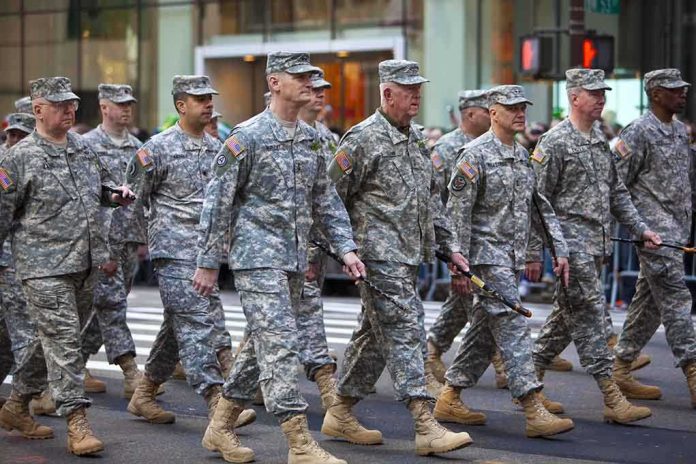🔴 Website 👉 https://u-s-news.com/
Telegram 👉 https://t.me/usnewscom_channel
The Trump administration’s move to reinstate a near-total abortion ban for veterans, eliminating exceptions for rape and incest, signals a decisive rollback of Biden-era policies and a renewed stand against taxpayer-funded abortion that’s set to ignite nationwide debate.
Story Snapshot
- The Trump administration proposes a rule to end nearly all abortion services through the Department of Veterans Affairs, including for cases of rape and incest.
- This action reverses a Biden-era policy that allowed limited abortion access for veterans since 2022.
- Supporters argue the move restores legal precedent and halts taxpayer-funded abortion, while critics claim it endangers veterans’ health and autonomy.
- The VA’s new policy would become one of the strictest in the nation, directly affecting over 9 million veterans and sparking significant political and public debate.
Trump Administration Seeks to Restore Near-Total Abortion Ban at VA
In August 2025, the Trump administration formally proposed reinstating a near-total abortion ban for veterans receiving care through the Department of Veterans Affairs (VA). This proposed rule eliminates exceptions that previously allowed abortions in cases of rape, incest, or when the pregnant person’s life was at risk, effectively dismantling a Biden-era policy set in 2022. The administration cites legal precedent, moral concerns, and opposition to taxpayer-funded abortion as primary motivators behind this dramatic policy shift.
The VA, the largest integrated health system in the nation serving over 9 million veterans—including more than 300,000 women of reproductive age—announced the policy change on August 4, 2025. Congressional Republicans and the Trump administration argue that the new rule upholds the sanctity of life and aligns the VA with longstanding federal funding restrictions on abortion, such as the Hyde Amendment. The administration’s stance is that federal agencies should not be used to circumvent state and federal law or to provide taxpayer-funded abortion on demand.
Policy Reversal Sparks Divided Reactions From Lawmakers and Advocates
The move to eliminate nearly all access to abortion through the VA has triggered immediate and sharp debate in Washington and across the country. Congressional Republicans, including key leaders, praised the decision as a return to legal and fiscal restraint, emphasizing that it prevents taxpayer dollars from funding abortions. In contrast, Congressional Democrats, led by Rep. Julia Brownley, have introduced legislation aimed at blocking the rollback and preserving reproductive health care options for veterans. Advocacy groups such as the Center for Reproductive Rights and Reproductive Freedom for All have issued strong condemnations, arguing that the proposed ban endangers the health, autonomy, and dignity of veterans, especially those who are survivors of military sexual trauma.
Opponents warn that the policy could have severe health consequences for veterans, particularly for women, transgender men, and non-binary individuals who may require abortion care. They highlight that over 400,000 women veterans live in states with severe abortion restrictions, making federal access through the VA especially critical. Medical and veterans’ organizations have echoed these concerns, emphasizing the unique health risks facing women veterans and the potential for increased trauma if forced to continue unwanted pregnancies resulting from rape or incest.
Implications for Veterans and the National Debate
Should the Trump administration’s proposal take effect, the VA’s abortion policy would become one of the strictest in the country, setting a new precedent for federal health agencies. In the short term, the change would result in the immediate loss of abortion access for veterans through the VA, even in cases of rape and incest. Long-term impacts could include increased health risks, out-of-pocket costs, and travel burdens for veterans seeking abortion care elsewhere, as well as heightened stigma and trauma for those affected by military sexual violence. The policy shift is expected to intensify political battles over abortion, federal authority, and veterans’ rights, potentially spurring new legal and legislative challenges at both state and federal levels.
While supporters maintain that the rollback restores legal precedent and prevents the misuse of taxpayer funds, critics argue it constitutes a direct attack on veterans’ health and fundamental rights. As the rule moves through the proposal stage, the outcome will hinge on public comment, congressional action, and potential court challenges. The debate underscores the enduring divide over abortion policy in America and the central role of the VA in serving a diverse veteran population amidst sweeping changes in national law.
WINNING!!!
Trump Admin Poised To Ditch Biden-Era Taxpayer-Funded Abortion For Veterans https://t.co/QhtDsbhDpY
— Steve A (@SteveV35B) August 7, 2025
Limited data is available on how many veterans previously accessed abortion services under the Biden-era policy, but advocates note that the impact will be acutely felt by those living in states with the strictest bans. As the story develops, veterans, lawmakers, and advocacy groups remain at the forefront of a fierce constitutional and moral debate with far-reaching consequences for the nation’s approach to reproductive rights and the role of government in health care.
Sources:
VA to End Abortion Services in Cases of Rape and Incest
5 Things to Know About the Trump Administration’s VA Abortion Ban
Fact Sheet: Abortion Access for Veterans
